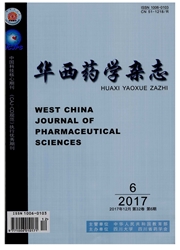

 中文摘要:
中文摘要:
目的研究湿度和温度对固体阿司匹林稳定性的影响。方法采用台阶变温变湿加速试验法,通过两次试验获得药物相关的降解动力学参数:一次是在恒温下进行的台阶变湿加速试验,另一次是在恒湿下进行的台阶变温加速试验。结果台阶变温变湿法得到的降解动力学参数为:m=1.19±0.02,Ea=95.1±1.5 kJ.mol-1,A=(1.78±0.92)×1012.h-1,与恒温恒湿法和程序变温变湿法得到的结果基本一致。结论与恒温恒湿法相比,台阶变温变湿法可节省时间、样品和工作量;结果的准确度和精密度均优于程序变温变湿法,且只需使用普通的恒温恒湿控制装置。
 英文摘要:
英文摘要:
OBJECTIVE To study the influence of humidity and temperature on the stability of Aspirin in the solid state.METHODS The stepped humidity and temperature controlled experiment was applied for evaluating the influence of humidity and temperature on the stability of Aspirin.Kinetic parameters were obtained by two individual experiments:one was the stepped humidity control at a fixed temperature,the other one was the stepped temperature control at a constant humidity.RESULTS The kinetic parameters obtained by the method:m=1.19±0.02,Ea=95.1±1.5 kJ·mol-1,A=(1.78±0.92)×1012 h-1,were comparable to those obtained from isothermal studies at constant humidity and also comparable to those obtained from the programmed humidifying and heating experiment.CONCLUSION In comparison to the isothermal studies at constant humidity,our method saved time,labor,and materials.Under the same experimental conditions,the results following the method were more accurate and precise than those obtained by the reported programmed humidifying and heating experiment.No specific computer-controlled environmental chamber is needed in this new method.
 同期刊论文项目
同期刊论文项目
 同项目期刊论文
同项目期刊论文
 期刊信息
期刊信息
